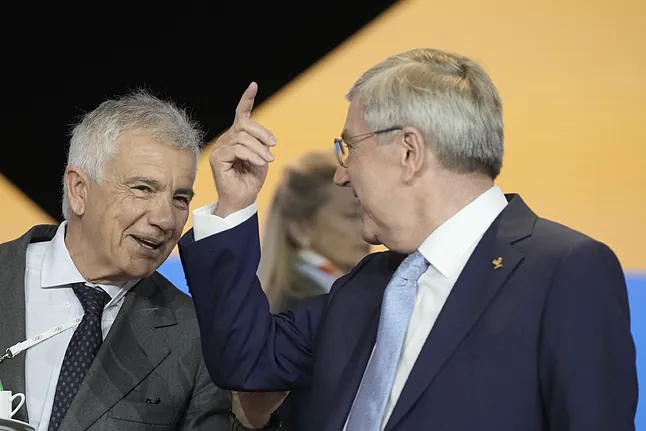"We can introduce financial awards at the Games. From my years as an athlete, I have always spoken about the importance of the financial well-being of sports. And I believe it can be done while respecting the Olympic philosophy. We must accept that we now live in a different world," announced Sebastian Coe, one of the seven candidates for the presidency of the International Olympic Committee (IOC), exploding the campaign that ended this Thursday. Suddenly, a tricky issue in which all candidates had to take a stand. Since its inception, the Olympic Games have promoted the amateur spirit of sports, "the important thing is to participate," but considering that the IOC generated 7 billion euros in the last Olympic cycle, the debate is logical. Should medals be rewarded or not?
Many national committees already reward their athletes for each gold, silver, and bronze - in Spain, 94,000, 48,000, and 30,000 euros, but in this case, it would be a prize from the organization itself. Coe is clear about it, and the other candidates too: the rest, not a chance.
Except for Coe, no one else has come out in favor of awards for a logical reason: there would be less money to distribute. If the over 1,000 medals awarded at the Olympic Games came with a financial reward, national committees and international federations would see their income reduced, and their presidents make up the bulk of the voters in the elections.
"I totally disagree [with Coe]. Champions should make a living from it, but it should be their Olympic committees, sponsors, or countries that reward their successes," responded Juan Antonio Samaranch Jr. in line with the other candidates. In fact, the candidates' rejection of Coe's proposal has been so resounding that the former middle-distance runner has had to clarify it. In his recent appearances, he has stated that there would be no generalized awards and that they would only exist in certain sports.
On the Horizon, the 2036 Host City
In any case, the debate has at least spiced up an electoral campaign with hardly any differences among the candidates. In other matters at hand, they have all agreed, even on the need for Russia's prompt reintegration into the Olympic movement, which could happen before the 2028 Los Angeles Olympics. The crisis in the global anti-doping system due to budget cuts by the Trump administration has emerged as a widespread concern, as well as the resistance to the inclusion of trans athletes in women's competitions.
Thomas Bach's directive was lenient towards trans women, but after most international federations closed the door on them, the current role of the IOC is symbolic. If the new president definitively vetoes trans women in the Olympic Games, that measure will hardly have any real effect, as they are already banned by the specific regulations of almost all sports.
For many IOC members, the most important thing is promises about their own relevance. After the crisis with candidate cities and corruption in Olympic host city elections like Rio de Janeiro, Bach decided to consolidate all power, and the Assembly could only reaffirm his decisions. Los Angeles was chosen as the host for 2028 and Brisbane for 2032 without the need for the classic voting process. Now, all candidates have promised members that they will regain control, and many have pledged to work towards having Olympic Games in unusual locations, especially in Africa.
On the horizon, the election for 2036 and the intention of Arab cities like Riyadh or Doha to apply. Currently, there are only four confirmed bids, Nusantara (Indonesia), Istanbul, Ahmedabad (India), and Santiago de Chile, but there will be more, and many years later, tension could return to the International Olympic Committee.
